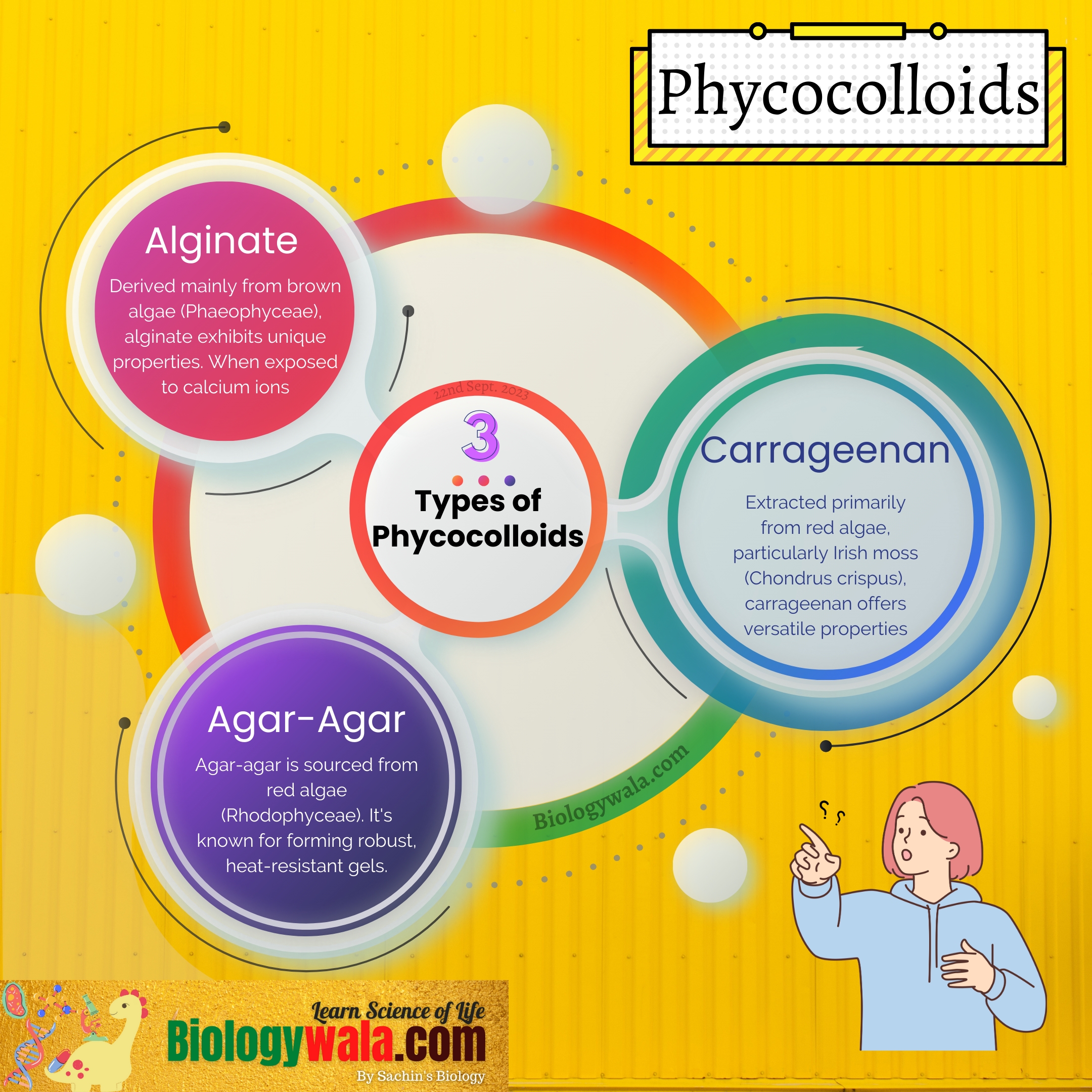Phycocolloids PDF: Definition, 3 Types, Applications

Definition: Phycocolloids are complex polysaccharides derived from various species of algae, and they play a crucial role in various industrial, pharmaceutical, and food applications.
Origin: These unique biopolymers are extracted from seaweeds and some freshwater algae, making them a valuable resource for both marine and aquatic environments.
Types of Phycocolloids:
- Alginate (Alginic Acid): Derived mainly from brown algae (Phaeophyceae), alginate exhibits unique properties. When exposed to calcium ions, it forms gels with varying thickness levels. This characteristic makes it a valuable ingredient in the food industry, where it’s used for gelling, thickening, and stabilizing various products, including salad dressings, dairy items, and wound dressings.
- Agar-Agar: Agar-agar is sourced from red algae (Rhodophyceae). It’s known for forming robust, heat-resistant gels. This quality makes it an excellent choice in microbiological laboratories, where it is used for solidifying culture media. Additionally, agar-agar is a key ingredient in confectionery and serves as a vegetarian alternative to traditional gelatin.
- Carrageenan: Extracted primarily from red algae, particularly Irish moss (Chondrus crispus), carrageenan offers versatile properties. It can create a range of gels and possesses exceptional thickening and stabilizing abilities. Carrageenan is classified into kappa, iota, and lambda types, each with specific characteristics. It finds applications in various sectors, including the production of dairy goods, meat processing, and pharmaceutical formulations.
Extraction and Processing:
Extraction Process: Phycocolloids are typically extracted using alkaline solutions, followed by precipitation and drying processes.
Purity and Quality: The quality of phycocolloids depends on factors like species selection, extraction methods, and processing conditions.
Applications of Phycocolloids:
Phycocolloids, derived from various algae, find diverse applications in different fields:
Food Industry: Phycocolloids are extensively used in the food industry as thickeners, stabilizers, and gelling agents. They enhance the texture and mouthfeel of processed foods, including dairy products, sauces, and desserts. Phycocolloids are integral in achieving the desired consistency and quality in these products.
Pharmaceuticals: In the pharmaceutical sector, phycocolloids play a vital role. They are employed in drug delivery systems to control the release of medications. Additionally, phycocolloids are utilized in wound dressings, providing a supportive and conducive environment for the healing process. They also serve as suspending agents for medications.
Microbiology: Agar-agar, a well-known phycocolloid, is widely used in microbiology laboratories. It serves as a solidifying agent for culture media, enabling the cultivation and study of microorganisms. Its gel-like properties create a stable base for microbial growth and research.
Cosmetics: Phycocolloids, such as alginate, are utilized in the cosmetics industry for their hydrating and soothing properties. Alginate-based masks and skincare products are popular choices for moisturizing and rejuvenating the skin. These products offer a natural and effective approach to skincare.
Biotechnology: Carrageenan, another prominent phycocolloid, finds applications in biotechnology. It is employed for cell immobilization, a process crucial in various biotechnological applications. Carrageenan is also utilized in protein purification processes, contributing to the isolation and purification of proteins for research and industrial purposes.
Physical and Chemical Properties:
Solubility: Most phycocolloids are soluble in water, forming colloidal solutions or gels.
Viscosity: Phycocolloids exhibit variable viscosity levels, depending on the type and concentration.
Gel Formation: Phycocolloids often form gels upon cooling, which is utilized in various applications.
Challenges and Future Prospects:
Sustainability: Sustainable sourcing and cultivation of algae for phycocolloid production to minimize environmental impact.
Regulations: Adherence to food and pharmaceutical regulations for product safety.
Research: Ongoing research to discover novel applications and improve extraction techniques.
Phycocolloids, derived from algae, are versatile biopolymers with a wide range of applications in food, pharmaceuticals, microbiology, cosmetics, and biotechnology. Their unique properties, sustainability, and ongoing research make them a promising field of study for future scientists in biology.
Also Read :
Algal Cell Culture PDF – Algal Culture And Seaweed Mariculture
Fungal Culture PDF: Fungal Culture Media
DNA Fingerprinting: 7 Critical Applications
[PDF] Production of Transgenic Plant for Biotic and Abiotic Stress: 7-Step Process
Join SACHIN’S BIOLOGY on Instagram or Facebook to receive timely updates and important notes about exams directly on your mobile device. Connect with Mr. Sachin Chavan, the founder of Sachin’s Biology and author of biologywala.com, who holds an M.Sc., NET JRF (AIR 21), and GATE qualifications. With SACHIN’S BIOLOGY, you can have a direct conversation with a knowledgeable and experienced.
![[PDF] Rod Cells and Cone Cells Function Notes: 10 Key Functions 2 [PDF] Rod Cells and Cone Cells Function Notes: 10 Key Functions](https://biologywala.com/wp-content/uploads/2023/07/Rod-Cells-and-Cone-Cells-Function-Notes-10-Key-Functions-1-520x245.webp)

![[PDF] Basic vs Applied Research: Pointwise Comparison 4 Basic vs Applied Research: Unveiling the Distinctions](https://biologywala.com/wp-content/uploads/2023/08/Applied-vs-Basic-research-1-1-520x245.webp)